- Author Curtis Blomfield blomfield@medicinehelpful.com.
- Public 2023-12-16 20:44.
- Last modified 2025-01-23 17:01.
Poor vision is a problem that is gaining momentum every day among the inhabitants of the planet. The most common diseases are astigmatism, farsightedness, myopia, glaucoma and cataracts. And nine out of ten eye diseases occur in residents of developing countries. Poor vision can be conditionally divided into 4 groups depending on the severity of the impairment: vision that is normal, with moderate impairment, with severe impairment, and blindness.
Risk group

This group includes people living in developing countries, people over 50 years old, children under 15 years old. In developing countries, in eight out of ten cases, it is possible to recover from the disease, but due to late visits to the doctor or ignoring the symptoms, the disease worsens, sometimes leading to blindness. In 65% of people, visual impairment is associated with age-related changes in the visual organs. Often eye diseases occur in children. They are dangerous because the disease progresses very quickly and leads to seriousviolations, but with timely seeking help, there is a great chance to cure poor vision.
The army grants respite to young people in case of certain types of diseases, among the most common of which is poor eyesight. But for this, the recruit must suffer from myopia of at least 6 diopters or hyperopia of at least 8 diopters.
And yet, if you have poor eyesight, what should you do?
Ways to deal with the disease. Their pros and cons

There are different ways to restore visual function or improve the quality of vision, which are divided into standard and alternative.
Standard includes glasses, lenses, laser vision correction.
The advantage of glasses is simplicity and cheapness. They do not touch the eyes, so they do not provoke diseases of the organs of vision. The downside is the need to constantly wear them with very poor eyesight. If the glasses are chosen incorrectly, nervous breakdowns, headaches and fainting are possible.
Poor vision is well corrected with lenses. During the use of lenses, the size and shape of objects are not distorted, peripheral vision is not limited. But they require some care (daily remove, process, do not use after the expiration date). Constant wear of lenses can lead to irritation and redness of the cornea, so be sure to have glasses in reserve.
Laser correction is a method that quickly restores vision. But after the procedure, dryness in the eyes may appear, and sometimes evenoperation must be repeated.

Alternative methods include various exercises, diets, meditation, massage, etc. With their help, you can relieve eye strain, but subject to the constant fulfillment of all appointments. This also includes perforated glasses, which reduce stress during heavy loads. But during their use, the usual field of view changes, binocular vision deteriorates.
To prevent visual impairment, you need to follow simple rules:
- You need to read in good light (otherwise your eyes will experience a lot of strain).
- Stay at the computer as little as possible, do exercises to relax the eye muscles (circular eye movements, frequent blinking, etc.) during breaks, use protective glasses to work at the monitor.
- Try to limit your intake of alcohol, starch, flour, caffeine.
- Wear sunglasses when it's sunny.
- Eat more blueberries (at least half a glass a day), carrots, grapefruits, foods containing vitamins K, A and zinc.






